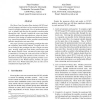861 search results - page 85 / 173 » Polymorphic Time Systems for Estimating Program Complexity |
124
click to vote
VEE
2009
ACM
15 years 9 months ago
2009
ACM
r of high-level languages lies in their abstraction over hardware and software complexity, leading to greater security, better reliability, and lower development costs. However, o...
117
click to vote
ASPLOS
2010
ACM
15 years 5 months ago
2010
ACM
Cores in a chip-multiprocessor (CMP) system share multiple hardware resources in the memory subsystem. If resource sharing is unfair, some applications can be delayed significantl...
ECAL
2005
Springer
15 years 7 months ago
2005
Springer
Abstract. Developmental models simulate the spatio-temporal development of a complex system. The system described in this paper combines the advantages of a number of previously di...
121
Voted
WORDS
2002
IEEE
15 years 7 months ago
2002
IEEE
The Worst-Case Execution-Time Analysis (WCET Analysis) of program code that is to be executed on modern processors is a highly complex task. First, it involves path analysis, to i...
139
Voted
ICSM
2009
IEEE
15 years 9 months ago
2009
IEEE
Model checking is a promising technique for verifying program behavior and is increasingly finding usage in industry. To date, however, researchers have primarily considered mode...

